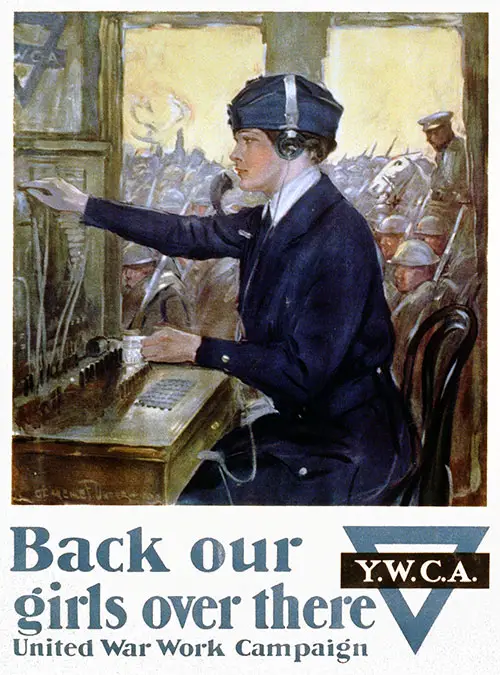What Peace Means to the YWCA - 1918

Back Our Girls Over There United War Work Campaign Poster. This Poster of the Telephone Girl at Her Switchboard "Somewhere in France, " Which Was Painted in Two Days by Clarence Underwood, Comes to Us as a Gift from One of America's Foremost Artists. War Work Bulletin No., 48, 15 November 1918. GGA Image ID # 1984d30c02
THOUGH the United States may remove the food restrictions, peace is not going to mean a diet of thick steak and pancakes for America, and America knows it. We have whole nations to feed, entire peoples to clothe, and the most stupendous task of economic reconstruction the world has ever seen.
"Reconstruction" after our Civil War lasted till the eighteen-nineties. Modern England's social troubles can be traced back definitely to the few years of disorganized peace after the Napoleonic Wars.
America has considered and tackled the problems of a great army. It must meet reconstruction in the same spirit. "Reconstruction work in France" has such a distant sound that much of its appeal is lost on the way.
But suppose it was the woman next door. Suppose her husband had been killed in the war, and she had been driven from home. As soon as peace came, would she not want above all else to restore as far as possible the map of her little world. And if you were her neighbor, it would be you, a woman, who would select a kitchen table for her that looked just like her old one.
To Miss Blanche Geary, the YWCA secretary who founded Hotel Petrograd for women war workers in Paris, French women are the women next door.
Because of her close touch with French women, Miss Geary has a vivid interest in reconstruction work. "The need for industrial reconstruction for women in France will be ten times greater after the war than it ever was before," said Miss Geary.
"This is because women will still be employed to a large extent, in the same factories converted to commercial uses. But the period following the war will call for an even higher type of patriotism and responsibility on their part.
"The women of America have been engaged in industry so long that they can offer suggestions that may help French women to understand and improve their situation.
"And they are so eager to learn from us! We must pass on our widest experience—the best we have to offer." The girls and women of America, those women who are more nearly the women next door, must also be helped.
A new spirit and a new sense of responsibility have developed during the war.
Labor has taken on a new and wonderful dignity. The Y. W. C. A. must recognize its responsibility for wise guidance and direction in preparing women for the days of social and industrial reorganization that are ahead.
Just as they have been doing their part to win the war, the women of America must plan to be ready to do their share in the great construction period to create a new world for all humanity.
They say that it will be five years after the day when peace is declared before the hundreds of women employed in Washington will close their desks and go home.
There will be miles of records, many tons of data, there will be an endless procession of facts and figures relating to the war—all to be put on record and the book completed and closed, before the services of these girls will be dispensed with.
In like ways, there will be work for everyone who has been engaged in war work or any activity connected with it. This work will continue for several years. It takes time to make war. We are about to take more time to unmake it.
The industrial centers of the YWCA must remain open so that the same large number of eager girls may still throng through its neighborly doors.
The leaders of the United War Work Campaign see this, and so does President Wilson. We must not allow the wonderfully efficient work of all the war organizations to lose their best effect by a slipshod, unthinking dwindling.
It is the greatest chance for constructive work that American women have ever had. It is women who are mainly fitted for the task that is before them. And YWCA workers have been specially trained to engage with all their power and equipment.
"What Peace Means to the YWCA," in the War Work Bulletin, New York: War Work Council of the National Board of the Young Women's Christian Associations, No. 48, 15 November 1918, pp. 1-2.
